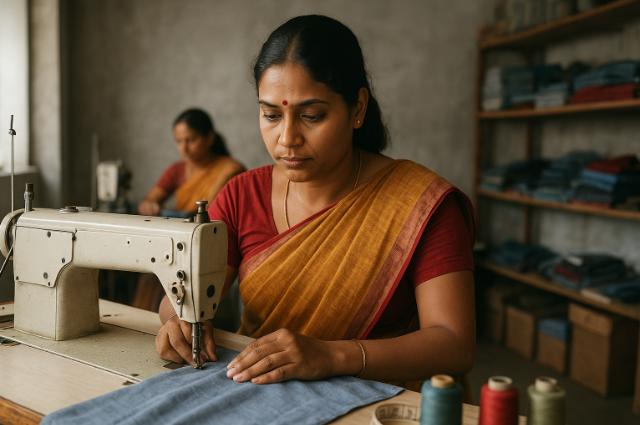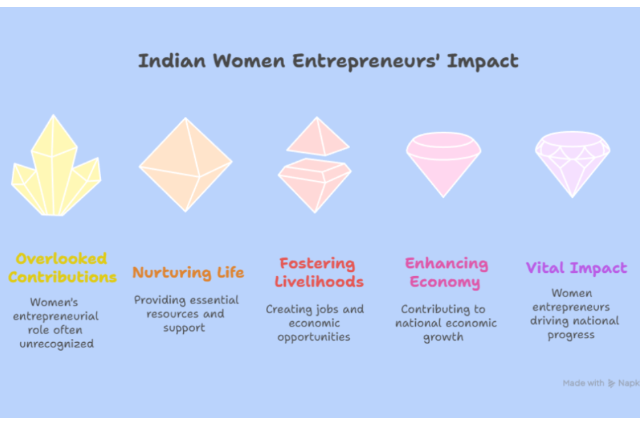
The Dual Creators of Life and Livelihood
India, a nation bustling with entrepreneurial spirit and economic aspirations, is increasingly recognizing the pivotal role of its women in shaping its future. Beyond the traditional confines of home, Indian women are stepping into the entrepreneurial arena, not merely as participants but as potent drivers of change. Indeed, women entrepreneurs are creators of life and also creators of employment for life. This profound statement encapsulates their dual contribution: fostering human life and simultaneously forging economic opportunities that sustain individuals and communities.
Historically, the narrative of entrepreneurship in India has largely been male-dominated. However, seismic shifts in socio-economic landscapes, coupled with evolving policy frameworks, have paved the way for women to assert their economic independence. This paper argues that the Indian woman entrepreneur, particularly in her capacity as a mother, embodies a unique blend of resilience, empathy, and strategic long-term vision that fundamentally underpins her success and, by extension, the nation's progress. Often juggling familial responsibilities with business acumen, she exemplifies a unique brand of entrepreneurship that extends beyond profit motives to encompass holistic societal well-being, making her an indispensable force in India's journey towards inclusive growth.
The Nurturing Ethos: From Home to Enterprise
The essence of a woman's contribution, whether in domestic life or in business, often revolves around a nurturing spirit. This inherent quality translates powerfully into the entrepreneurial domain. Nurturer of life and nurturer of business's life cycle, the Indian woman entrepreneur approaches her venture with patience, foresight, and a deep commitment to sustainability. Just as she nurtures a child from infancy through various stages of growth, she tends to her business, understanding that consistent care, adaptation, and vision are paramount for its survival and prosperity.
This nurturing ethos manifests in several ways:
- Long-term Vision: Unlike ventures purely driven by short-term gains, women-led businesses often prioritize stability and growth over immediate, potentially unsustainable profits. This mirrors the long-term planning inherent in raising a family.
- Resilience and Adaptability: Indian women entrepreneurs frequently face systemic challenges, from access to finance to social biases. Their ability to adapt, persevere, and find innovative solutions is a testament to the resilience honed through managing complex life situations, akin to adapting to a child's evolving needs.
- Employee Welfare and Community Impact: Many women-led enterprises, particularly at the micro and small scale, are characterized by a greater emphasis on employee well-being, fair practices, and community engagement. This extends the 'nurturing' beyond the immediate family to the broader ecosystem within which the business operates, fostering a sense of shared growth and responsibility.
- Resourcefulness: Operating often with limited resources, women entrepreneurs exhibit remarkable ingenuity in optimizing inputs and maximizing outputs, transforming constraints into opportunities—a skill honed through managing household budgets and resources skilfully.

This ingrained nurturing instinct, therefore, becomes a significant competitive advantage, allowing their businesses to weather economic fluctuations and contribute to a more stable and equitable economic landscape.
The Mother Entrepreneur: A Unique Catalyst for Economic Development
The most compelling aspect of the Indian woman entrepreneur's contribution lies in her dual role, particularly when she is also a mother. The intersection of maternal responsibilities with entrepreneurial drive creates a powerful dynamic that directly impacts both human capital and economic development. She helps in the development of children and the development of the Indian economy.
A mother entrepreneur's motivations often stem from a desire to provide a better life for her children – better education, nutrition, healthcare, and opportunities. This aspiration fuels her entrepreneurial zeal. The income generated from her business directly translates into improved family welfare.
- Enhanced Human Capital: Studies consistently show that when income is in the hands of women, a larger proportion is allocated to children's education, health, and nutrition. For instance, a 2019 report by NITI Aayog highlighted that an increase in women's economic empowerment leads to better educational outcomes for children, reduced child mortality, and improved family health. This investment in the next generation's human capital is a direct contribution to the nation's future productivity and innovation potential. By ensuring their children are educated and healthy, mother entrepreneurs are essentially investing in India's future workforce, thereby raising the economy from its very foundation.
- Breaking Intergenerational Cycles of Poverty: For many women from marginalized communities, entrepreneurship offers a pathway out of poverty. By establishing her own source of income, a mother not only improves her current family's living standards but also sets a precedent for her children, particularly daughters, inspiring them towards financial independence and breaking cycles of poverty across generations.
- Role Models and Aspirations: A mother running a successful business serves as a powerful role model for her children. They witness firsthand the value of hard work, perseverance, and financial acumen. This exposure to entrepreneurship at home can cultivate an entrepreneurial mindset in the next generation, fostering a culture of innovation and self-reliance crucial for sustained economic growth.
- Local Economic Spillover: Mother entrepreneurs often start businesses that cater to local needs, creating employment within their communities and fostering local economic ecosystems. Whether it's a home-based food business, a tailoring unit, or providing digital services, these ventures stimulate local demand and supply chains, leading to a ripple effect that strengthens the grassroots economy.
Thus, the mother entrepreneur, driven by the profound instinct to nurture and provide for her offspring, inadvertently becomes a significant engine for national growth. Her micro-level decisions and efforts aggregate into macro-level economic impact, demonstrating how a mother's dedication to her family can literally contribute to raising the Indian economy.
Statistical Landscape and Economic Contributions
The rise of women entrepreneurs in India is not merely anecdotal; it is substantiated by compelling statistical data, despite facing challenges in accurate and comprehensive data collection.
- Growing Presence: According to a 2018 study by the Global Entrepreneurship Monitor (GEM), India has one of the highest rates of women's entrepreneurship globally for early-stage entrepreneurs, with nearly 14% of women starting or running new businesses.
- MSME Sector Dominance: Women are particularly prominent in the Micro, Small, and Medium Enterprises (MSME) sector. Statistics from the Ministry of MSME reveal that approximately 20% of MSMEs in India are owned by women. While this figure might seem modest, it represents millions of individual enterprises, many of which are home-based or operate at a micro-level, playing a crucial role in local economies and employment generation.
- Job Creation: A significant report by Google and Bain & Company (2019) on 'Women Entrepreneurship in India' projected that by 2030, women-owned businesses could generate 150-170 million jobs, contributing 2.5-3% to India's GDP, transforming India's economy and society. This highlights the immense, untapped potential that women entrepreneurs hold for employment creation far beyond their own ventures.
- Contribution to GDP: While precise individual contribution figures are hard to isolate, the collective impact of women-led MSMEs and larger enterprises is substantial. Estimates suggest that women entrepreneurs contribute significantly to the informal sector, and their growing presence in the formal economy is steadily raising their share in the national GDP. The Mastercard Index of Women Entrepreneurs (MIWE) 2021 placed India at 37th out of 65 economies, indicating progress but also highlighting significant scope for improvement in supporting women's entrepreneurship.
- Sectoral Diversity: Women entrepreneurs are increasingly diversified across sectors, moving beyond traditional areas like handicrafts and textiles into IT, education, healthcare, e-commerce, and various service industries. This diversification indicates growing access to skills, technology, and market opportunities.
- Self-Help Groups (SHGs): India hosts a robust network of SHGs, predominantly comprising women. These groups have facilitated micro-entrepreneurship on an unprecedented scale, particularly in rural areas. The collective strength of SHGs, often supported by government schemes like the Deendayal Antyodaya Yojana - National Rural Livelihoods Mission (DAY-NRLM), has empowered millions of women to start small businesses, access credit, and build collective bargaining power, directly contributing to poverty reduction and rural economic vitality.
These statistics underscore the transformative power of women entrepreneurs, not just as economic agents but as social innovators who are redefining the landscape of Indian business.
Challenges and Opportunities
While the trajectory for Indian women entrepreneurs is promising, they face a unique set of challenges:
- Access to Finance: Despite initiatives, women often struggle to access formal credit due to a lack of collateral, limited financial literacy, and gender bias from lenders.
- Social and Cultural Barriers: Deep-seated patriarchal norms, family responsibilities, safety concerns, and mobility restrictions often limit women's ability to operate businesses effectively.
- Skill Gaps: Many women lack formal business education, technical skills, and access to training programs necessary to scale their ventures.
- Market Access and Networks: Limited access to markets, distribution channels, and professional networks can hinder growth.
- Digital Divide: While digitalization offers immense opportunities, a significant digital literacy gap persists for many women, particularly in rural areas.
However, these challenges are increasingly being met with opportunities and supportive ecosystems:
- Government Initiatives: Schemes like Stand-Up India, Mudra Yojana, Mahila E-Haat, and Startup India provide financial assistance, skill development, and market linkages specifically for women entrepreneurs.
- Digital Transformation: E-commerce platforms, social media marketing, and digital payment systems offer unprecedented opportunities for women to reach broader markets and overcome geographical barriers.
- NGOs and Incubators: A growing number of non-governmental organizations, incubators, and accelerators are dedicated to providing mentorship, training, and networking opportunities for women.
- Changing Social Attitudes: Increased awareness about gender equality and the economic benefits of women's empowerment are gradually leading to more supportive family and community environments.
Conclusion: The Indispensable Force of Nurturing Entrepreneurship
The Indian woman entrepreneur stands as a testament to resilience, innovation, and an unwavering commitment to both family and nation. As a "creator of life and also creator of employment for life," she embodies the dual engines of human and economic progress. Her inherited and cultivated role as a "nurturer of life and nurturer of business's life cycle" infuses her entrepreneurial ventures with sustainability, empathy, and a long-term vision crucial for enduring success.
More profoundly, in her role as a mother, she acts as an indispensable architect of the nation's future. By prioritizing her child's development – investing in education, health, and well-being – she directly contributes to building a stronger human capital base for India. This deeply personal motivation translates into a powerful aggregated impact, demonstrating how she helps in the development of children and the development of the Indian economy. The consistent, often unheralded, efforts of mother entrepreneurs in improving familial conditions ripple outwards, uplifting communities and bolstering the national economy from the grassroots.
To fully harness this immense potential, sustained efforts are required to address systemic barriers. Enhanced access to finance, digital literacy, mentorship, and robust policy support are crucial. As India continues its economic ascent, recognizing, celebrating, and empowering its women entrepreneurs, especially those balancing the profound responsibilities of motherhood, will not merely be an act of social justice but a pragmatic investment in a more inclusive, prosperous, and resilient national future. Their nurturing spirit, extended from home to enterprise, is fundamentally raising the Indian economy, one life and one livelihood at a time.
. . .
References:
- NITI Aayog & Google. (2019). Women Entrepreneurship in India:
A Roadmap for Empowering Women Entrepreneurs. - Bain & Company & Google. (2019). Women Entrepreneurship in India: A Path to Economic and Social Transformation.
- Global Entrepreneurship Monitor (GEM). (2018-2019). Global Report.
- Ministry of Micro, Small & Medium Enterprises, Government of India. (Various Reports).
- Mastercard Index of Women Entrepreneurs (MIWE). (2021).
- Various reports and publications from the Reserve Bank of India, National Bank for Agriculture and Rural Development (NABARD), and academic journals on gender and development in India.
